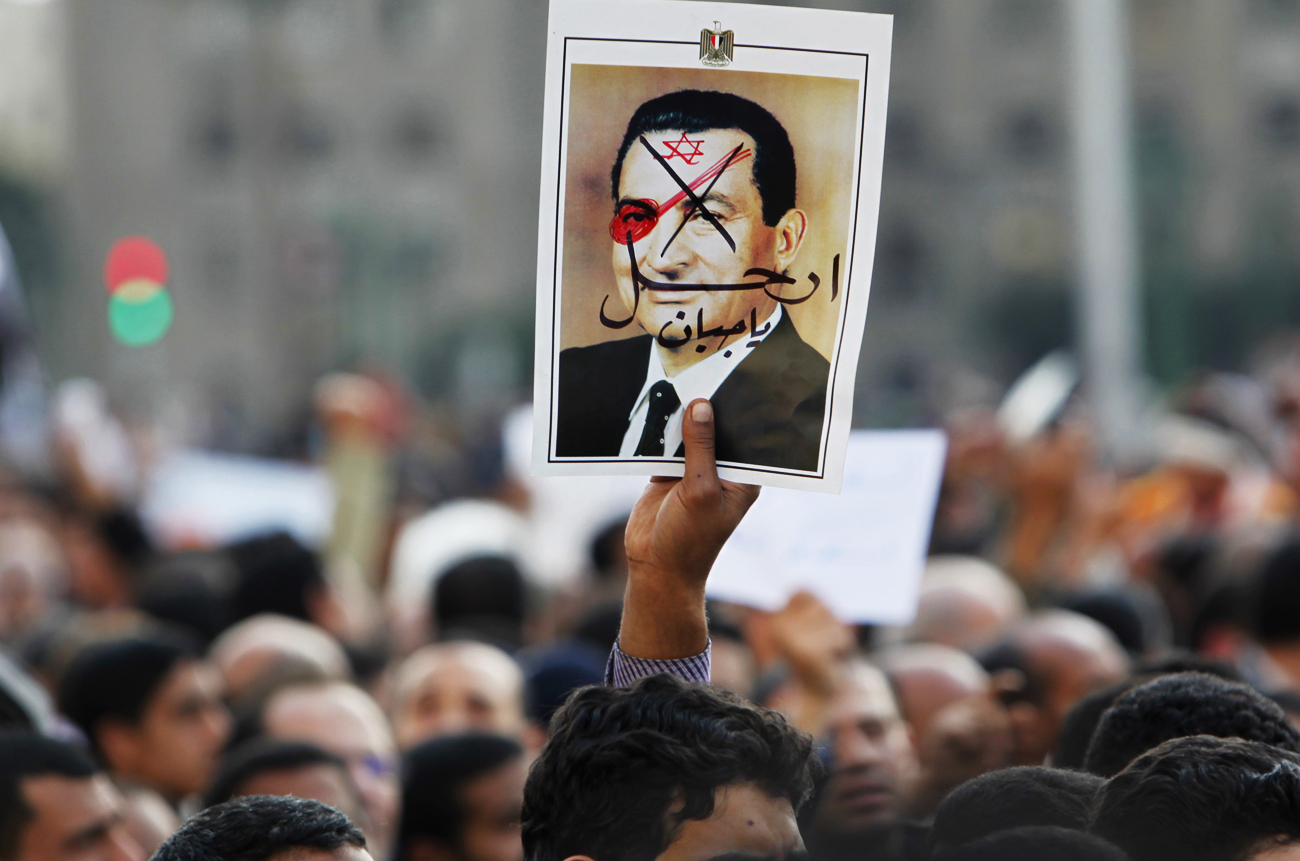Over the weekend, developments in Egypt continued to be confused, chaotic and often violent. The Egyptian military has been bringing in fresh forces to reinforce its presence in key locations in Cairo and other cities, even as protestors continued to gather in many of the same places, defying government curfews. The police have been withdrawn from being a visible presence in most of the country’s major cities, looting is beginning to break out and the inhabitants of Cairo neighbourhoods have begun forming ad hoc patrols to protect their homes, property and families from random acts of violence and worse.
Meanwhile, the Egyptian government had pulled the plug on Egypt-based operations of Al Jazeera, the Qatar-based satellite TV broadcaster with the broadest reach in the Middle East. This movement to curtail free-flowing information parallels earlier Egyptian government efforts to tamp down the impact of social networking and the Internet when they essentially shut down connectivity.
Now, a growing number of foreign nations are organising or planning evacuation flights of their citizens from Egypt, drawing further attention to growing alarm about President Hosni Mubarak’s actions. For example, the American embassy has now informed its nationals that US citizens who wish to depart should be aware “that the Department of State is making arrangements to provide transportation to safe haven locations in Europe”. As final proof that things must be getting pretty scary on the ground, according to late reports, the Iraqi embassy is planning to organise to airlift its nationals to safety in Baghdad. Baghdad as a safe haven from Cairo?
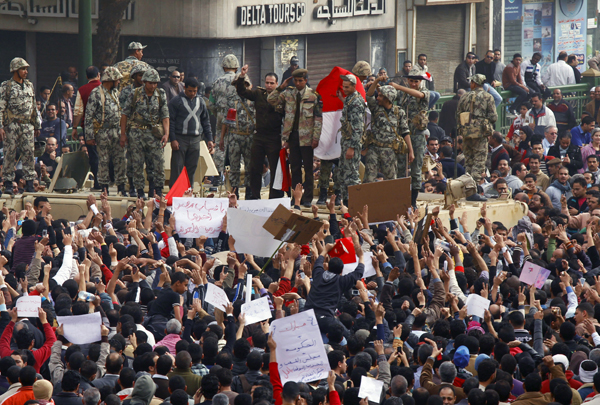
Photo: An Egyptian army officer salutes protesters from atop an army armoured personnel carrier in Tahrir square in Cairo January 29, 2011. Egyptian President Hosni Mubarak refused on Saturday to bow to demands that he resign after ordering troops and tanks into cities in an attempt to quell an explosion of street protests against his 30-year rule. REUTERS/Yannis Behrakis.
Nonetheless, so far at least, Egyptian citizens seem to be achieving a sense of rapport with the military deployed in their cities (although not with the generally hated security police). Reporters have been pointing to scenes where protestors have cheered the military presence, painted anti-Mubarak slogans like “30 years of humiliation and poverty” on the sides of parked tanks and even joined soldiers atop their patrolling vehicles.
Mohamed el Baradei, the former International Atomic Energy Agency head and Nobel Prize winner to boot, may be emerging as a pivotal opposition figure, even though he has been largely absent from Egypt for many years while working at the UN. Because they know him so well, it’s a good bet western foreign chanceries are increasingly pondering the chances El Baradei can leapfrog all the obstacles to become, at the very least, Egypt’s transitional leader. El Baradei may not have been Washington’s favourite UN bureaucrat during the Bush administration for his failure to back up US claims about those weapons of mass destruction Saddam Hussein was supposedly building; but that was then, this is now. And Bush is back in Texas.
Over the past several days, El Baradei has been telling international news agencies, “What we have begun, we cannot go back [on],” and “It is loud and clear from everybody in Egypt that Mubarak has to leave today.” El Baradei has called for a national unity government after Mubarak leaves office, adding “all the measures [must be] set in place for a free and fair election.” And, most recently, speaking on Sunday at yet another Tahrir Square rally, El Baradei told the crowd “Mubarak must leave the country and save our nation”.
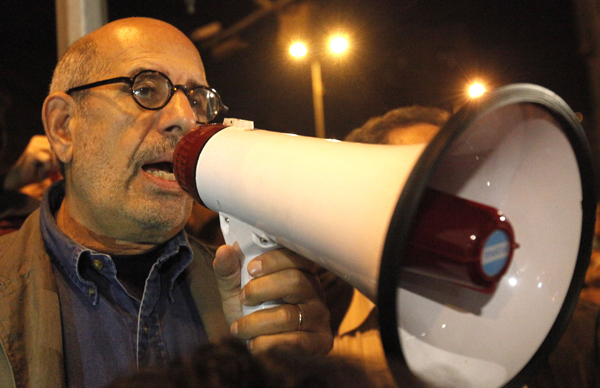
Photo: Egyptian opposition leader Mohamed ElBaradei speaks to protesters at Tahrir Square in Cairo January 30, 2011. ElBaradei told thousands of protesters in central Cairo on Sunday that an uprising against Hosni Mubarak's rule "cannot go back". REUTERS/Asmaa Waguih
Late Sunday night, The New York Times was reporting what might well have become a key moment when one of its reporters in Cairo, Anthony Shadid, wrote: “The uprising, which began as a spontaneous grass-roots movement, appeared to coalesce, at least for the moment, as the largest opposition group, the Muslim Brotherhood, threw its support behind a leading opposition figure, the Nobel laureate Mohamed el Baradei, to negotiate on behalf of the protesters.”
But other alternatives are also possible, even with the Muslim Brotherhood. Over the weekend, 34 of the Brotherhood’s leading, but imprisoned leaders walked out of one of Egypt’s prisons when the guards abandoned their posts. It remains unclear, as a result, what kind of revolution Egypt is heading towards – or if indeed it will even be a revolution rather than a slow motion coup d’état.
In a move apparently aimed at forestalling his immediate resignation – or to prepare the ground for it depending on what tea leaves you read - Mubarak appointed Omar Suleiman, his close aide and the government’s intelligence chief, as the country’s new vice president and another supporter, Ahmed Shafik as prime minister. These moves immediately set in motion rumours Mubarak was about to resign and flee the country.
After all, Egypt hasn’t had a vice president since Mubarak himself took over from his predecessor, Anwar Sadat, who was assassinated back in 1981. Mubarak’s misgivings are probably fuelled by the fact that, since 1952, Egyptian vice presidents have tended to replace or shoulder aside their presidents. Not surprisingly, then, Mubarak has avoided naming a “veep” because of these awkward, untidy circumstances.
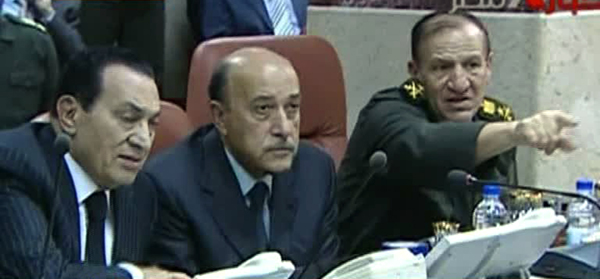
Photo: In this still image taken from video, Egypt's President Hosni Mubarak (L) and Vice President Omar Suleiman (C) hold a meeting with top commanders in Cairo, January 30, 2011. REUTERS/Egyptian State TV
Nevertheless, Suleiman (or Shafik for that matter) are unlikely to be the kind of ex-military men who will rally support from the average Egyptian man-in-the-souk for a return to national calm, although they just may aid Mubarak in easing into a transition away from his rule with the military’s support. The problem is that, so far, very little has actually come into clear focus during Egypt’s week of populist revolt. One of the few things that is clear is that Egypt’s growing political uncertainties are giving international Mideast policy analysts and decision–makers some heightened anxiety – most especially in the US, but almost certainly in Israel as well as the rest of the Middle East.
For American policy makers, the Egyptian situation represents opportunities and pitfalls – and perhaps both simultaneously. Because of this conflict, American responses so far have been more timid than might otherwise have been expected. In essence, Egypt is one of those unavoidable collisions between two deep strands in American foreign policy; pitting underlying American sympathies for the abstract goal of democratic rule and free elections as a universal good against the grubbier recognition that Mubarak’s government has played that good old “moderating role” in the Middle East and has contributed to stability in the region. Surprisingly, George W Bush’s Cairo speech a while back actually sounded the tocsin for democratic values more vividly than did Barack Obama’s speech in the same city less than two years ago.
An Egypt that truly moved towards a more democratic system might well be an attractive beacon of hope for people living in those other geriatric autocracies in the Middle East. But, at the same time, an unstable Egypt that unravels the strategic ties between Egypt and the US and the stable, but sometimes “cold peace” between Egypt and Israel, would considerably complicate American strategic objectives for the region – let alone those of the Israelis.
These include efforts to maintain a stable, reasonable balance of power between the Israelis and Egyptians that conceivably can contribute to a more comprehensive Arab/Palestinian-Israeli peace treaty some day, to support the stability of regimes in Persian Gulf (remember all that oil that has to flow to the rest of the world and some of it flows through the Suez Canal), to contain Hezbollah-style extremist nationalism in the region that could draw sustenance from a chaotic situation in Egypt, to nurture Iraqi stability and even to restrain the appeal of radical Iranian influence in the region. For this reason, Barack Obama, along with a number of other western leaders, has been reluctant, so far, to call explicitly for Hosni Mubarak’s departure as Egypt’s leader. But even that equivocal stance has pitfalls. This reticence by Obama may lead many Egyptians to dismiss the reality of American support for or belief in those abstract democratic ideals.
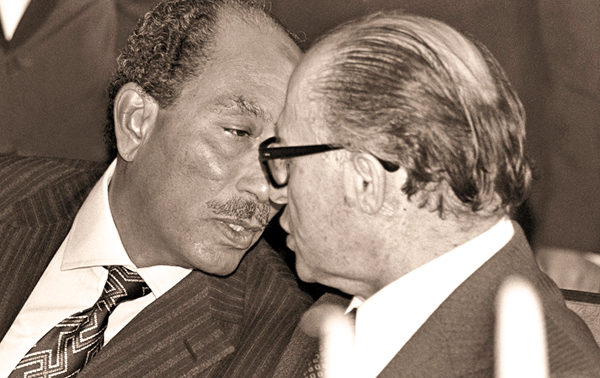
Photo: Then Egyptian President Anwar Sadat (L) head to head with then Israeli Prime Minister Menachem Begin in 1977 when Sadat made his historic visit to Jerusalem, becoming the first Arab leader to visit the Jewish state since its birth in 1948. Sadat and Begin went on to hold secret talks at Camp David with United States President Jimmy Carter and eventually signed a peace treaty in March 1979. REUTERS
Along the way, by virtue of more than a billion dollars a year of military assistance (plus more as economic stabilisation funds), substantial military training funding and major amounts of military equipment transfers and sales, the US defence establishment has built a close, multi-generational relationship with Egypt’s military leadership. In fact, since Egypt suddenly switched from being a Russian ally to being an American one, Egypt has actually become the second–largest recipient of American aid worldwide. The Egyptian army is now thoroughly built around the American Abrams tank, rather than those Russian main battle tanks the Israelis used to face. Describing these ties, The New York Times noted the other day: “The officer corps of Egypt’s powerful military has been educated at defence colleges in the US for 30 years. The Egyptian armed forces have about 1,000 American M1A1 Abrams tanks, which the US allows to be built on Egyptian soil. Egypt permits the American military to stage major operations from its bases, and has always guaranteed the Americans passage through the Suez Canal.
“The relationship between the Egyptian and American militaries is, in fact, so close that it was no surprise on Friday to find two dozen senior Egyptian military officials at the Pentagon, halfway through an annual week of meetings, lunches and dinners with their American counterparts.
“By the afternoon, the Egyptians had cut short the talks to return to Cairo, but not before a top defence department official, Alexander Vershbow, had urged them to exercise ‘restraint’, the Pentagon said.”
But the current confused situation in Egypt may soon test American assumptions that all these close connections have given the US real influence over how Egypt’s military leadership behaves. If the military sends Mubarak packing and unilaterally appoints one of its own as the next president, thereby demonstrating a kind of “independence” from American influence, this might well jeopardise US–Egyptian defence ties, decrease American leverage and increase Israeli concerns and fears about the modus vivendi that has been nurtured between those two Mideast nations since 1979. That unintended consequence could make the region’s governments even more jittery than they already are. And we haven’t even talked about how that would go down in the Persian Gulf and the Arabian Peninsula. Of course, the result could be a democratic, peaceful state, intent upon economic growth and development and totally committed to enlarging the possibilities of a comprehensive Mideast peace process. But in this ever-developing string of events, it is almost impossible to predict. DM
For more, read: Jubilant Protesters Hail El Baradei at The New York Times, Calling for Restraint, Pentagon Faces Test of Influence With Ally at The New York Times, Obama Presses for Change but Not a New Face at the Top at The New York Times, Governments Scramble to Fly Citizens Out Of Egypt at The New York Times, Egypt protests: Tension rises as jets buzz Cairo square at the BBC, The CIA's complicated relationship with Egypt at The Washington Post, Decode the Cairo Cables (WikiLeaks) at The Washington Post, The battle of Cairo is over, or is it? at The Economist, The scent of jasmine spreads: As protests erupt in Egypt, Arab leaders everywhere should take heed at The Economist.
Main photo: A protester holds up a poster of President Hosni Mubarak in downtown Cairo, January 30, 2011. Mubarak, clinging to power despite unprecedented demands for an end to his 30-year rule, met on Sunday with the powerful military which is widely seen as holding the key to Egypt's future. The words in Arabic read "Leave coward". REUTERS/Asmaa Waguih.





